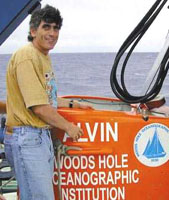Professor
Marine Biology and Biochemistry
University of Delaware
College of College of Earth, Ocean, and Environment
700 Pilottown Rd.
Lewis, DE 19958
Email: caryc@udel.edu
Phone: (302) 645-4078
Fax: (302) 645-4007
Ph.D., Scripps Institution of Oceanography,
M.S., San Diego State University,
B.S., Florida Institute of Technology,

The emphasis of Dr. Cary’s current research is in the use of molecular techniques in microbial community structure analysis with an emphasis on understanding the interactions among bacterial communities in extreme environments. One investigation centers on Alvinella pompejana, the Pompeii worm. His report on this eukaryotic metazoan is believed to be the first report of a higher-order life form that is capable of surviving sustained, long-term exposure to temperatures up to 176 degrees Fahrenheit (80 degrees Celsius).
According to Dr. Cary, his findings on the Pompeii worm should boost the global search for new extremophiles — organisms tough enough to thrive in hot, corrosive, high-pressure environments. The applications for these organisms seem endless because heat-loving enzymes help to convert cornstarch to sugar, to dislodge oil inside wells and support a host of other industrial processes by speeding biological and chemical reactions. Eurythermal enzymes may prove useful even in pharmaceutical production, he says.
Dr. Cary is also developing molecular diagnostic tools for detecting and quantifying harmful species of algae in Delaware waters. Of particular concern are dinoflagellates, which are often toxic, as seen in the Pfiesteria-related fish kills along the mid-Atlantic coast.